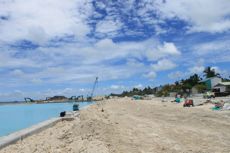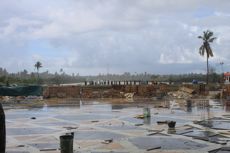The Civil Court has issued an injunction temporarily blocking a decision by the head leaseholder of the Palm Beach Resort and Spa to terminate a sub-lease agreement with the property’s current management.
The Ministry of Tourism, Arts and Culture has confirmed that the resort, based in Lhaviyani Atoll, is to remain under the management of Sun Sporting Holidays Limited until the conclusion of a court case to determine the legality of terminating the companty’s sub-lease agreement.
“Sun Sporting Holidays filed a case against the leaseholder and the court issued an order stating that the termination notice should be suspended until the court decided whether the termination is lawful of not,” Tourism Ministry Senior Legal Officer Faseeh Zahir explained to Minivan News.
“So, the ministry accordingly extended the temporary permit for resort operation to Sun Sporting Holidays,” he said.
No date has yet been set for the next hearing in the case, according to the ministry.
In a document (part 1, part 2, part 3) dated July 15, 2013, Leaseholder Ibrahim Ali Maniku issued a notice of termination for the agreement between himself and Sun Sporting Holidays Limited to operate the Palm Beach Island Resort and Spa.
He wrote that the decision was based over concerns the company, as sub lessee, had failed to meet a number of safety standards and mandatory requirements set out by the Tourism Ministry and other local authorities.
Citing a Tourism Ministry report from April 11, 2013 – Number: 88QAR/PRIV/2013/604 – the notice alleges that of 97 observations and violations noted by authorities at the time, 61 were considered serious and in need of immediate rectification.
According to the leaseholder, a maximum period of no more than three weeks from the publication of the report were provided for any short comings or violations raised by the ministry to be dealt with by management on the site. The notice does not clarify if the required changes were made within the deadline.
The leaseholder however alleged that 14 “major violations” of the General Regulation for Food Establishment and Service of Maldives (2007/182/FSI) raised by the Tourism Ministry had not been corrected during a further inspection held a month later.
The notice claimed that Sun Sporting Holidays had also failed to register the property’s desalination plant with the Environmental Protection Agency (EPA), as well as ensuring the resort’s power system was approved by the Maldives Energy Authority (MEA).
Concerns were also raised in the document over the EPA’s conclusions concerning the impact of severe erosion on the island’s coastline, which is claimed to have led to serious damage to the site’s ‘‘A la Carte’ restaurant as well as the loss of 17,953 square metres of land since the sub-lease agreement had come into force.
The notice claimed the sub lessee had additionally failed to comply with the EPA’s recommendations of relocating the resort’s reverse osmosis desalination) intake away from “the site where sewage is discharged”.
Sun Sporting Holidays was also accused by the leaseholder of failing to address recommendations by the Maldives National Defence Force (MNDF) to repair the resort’s fire alarm and fire hydrant systems that had previously been found to be out of order, while also failing to prepare and practice drills as part of an emergency fire plan.
When contacted by Minivan News this week, Sun Sporting Holidays said Palm Beach Resort and Spa remained under its management and was being operated as normal.
However, the company declined to comment further on the termination notice sent by the island’s leaseholder while legal action into the matter was ongoing.

